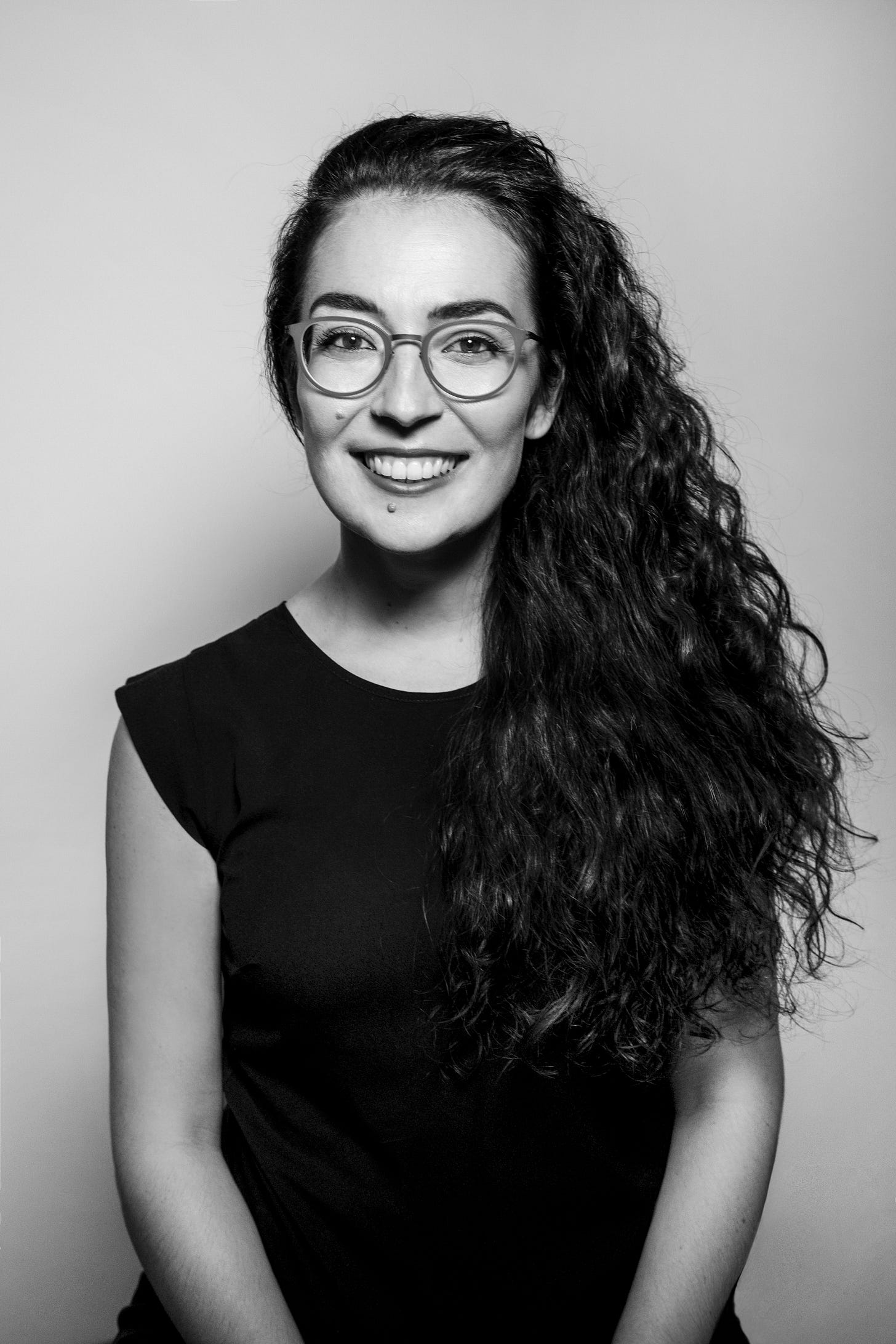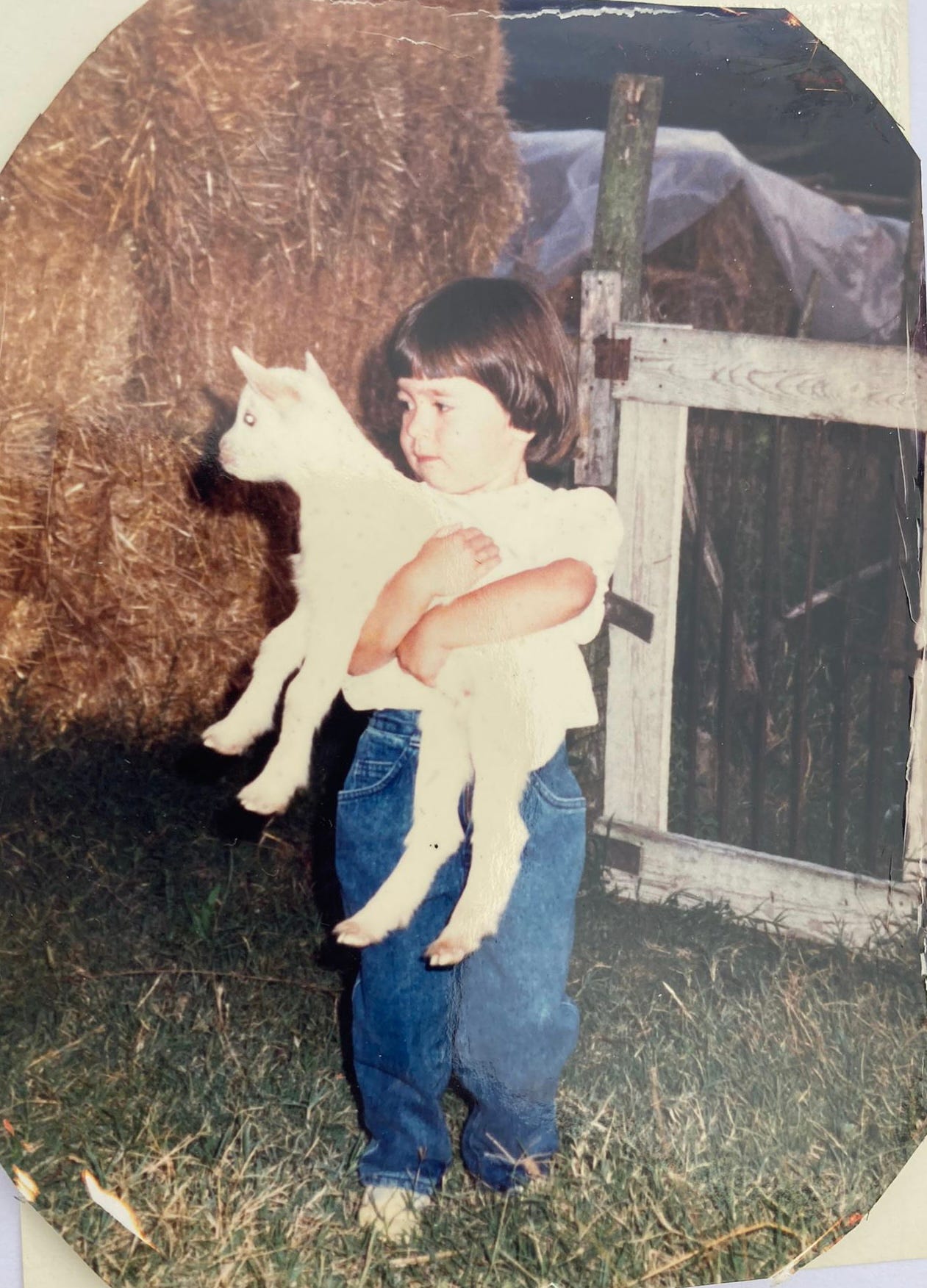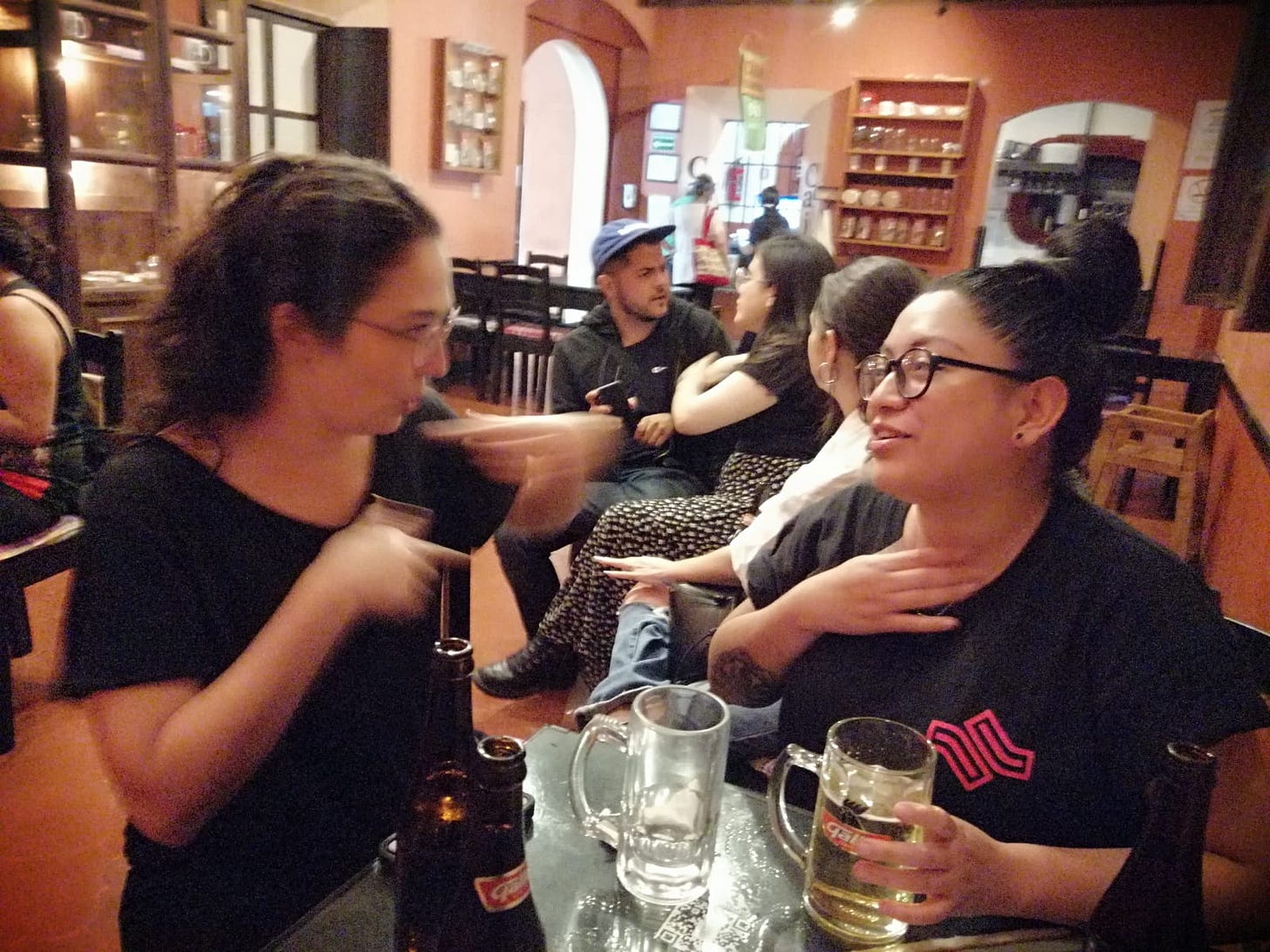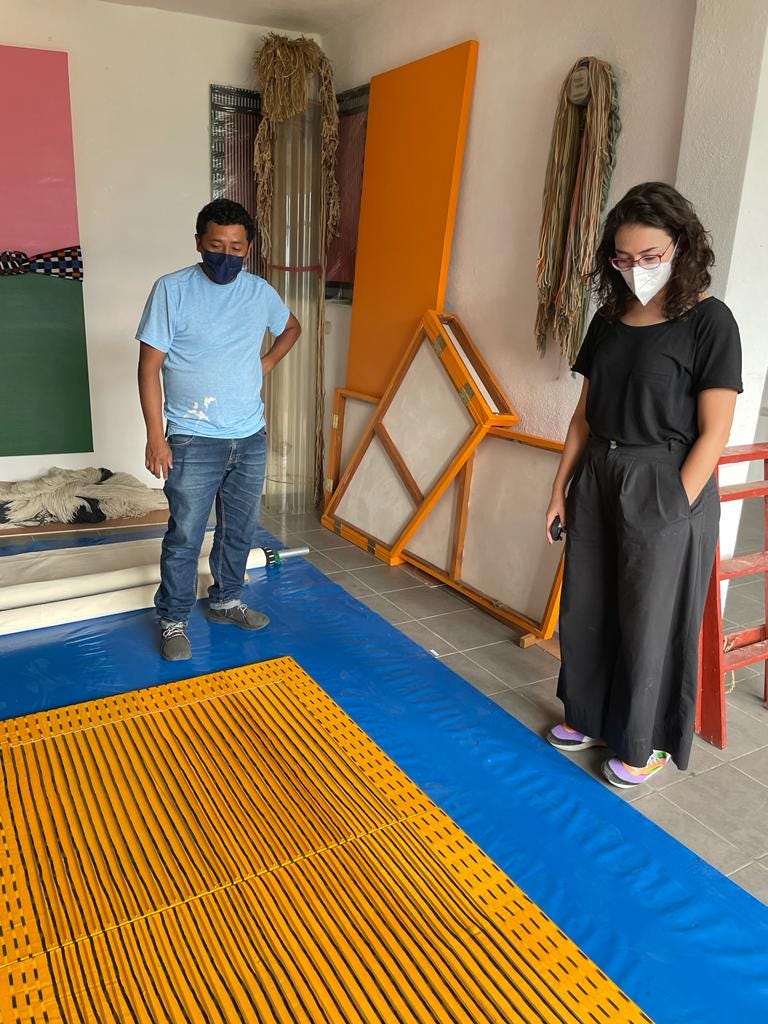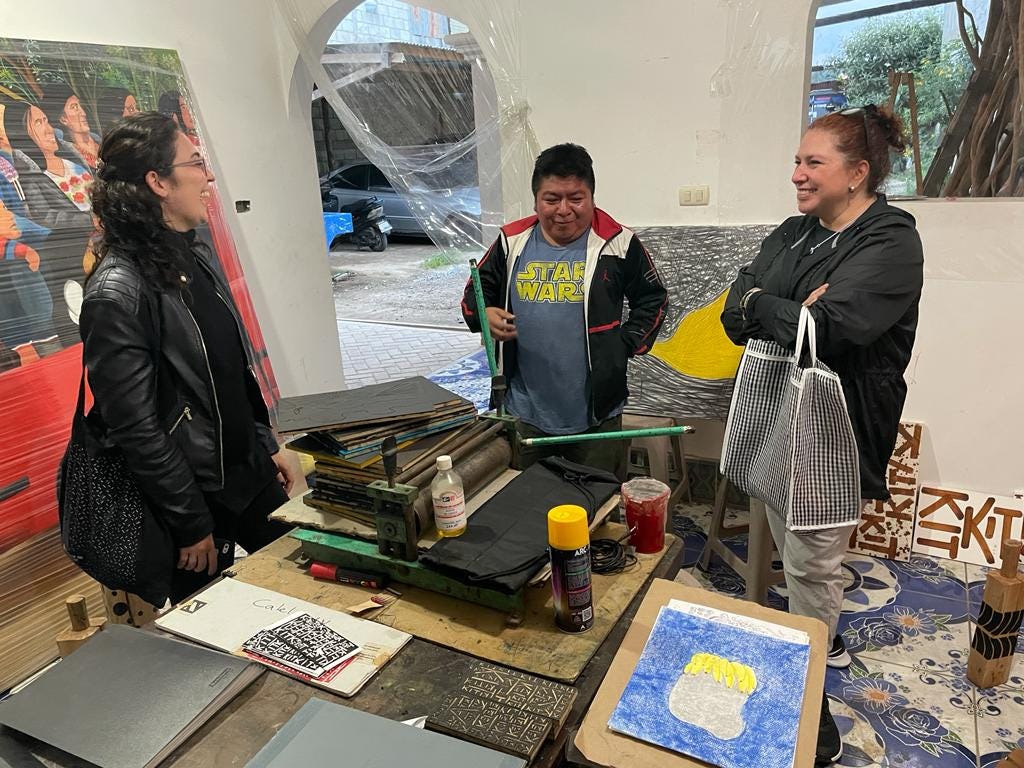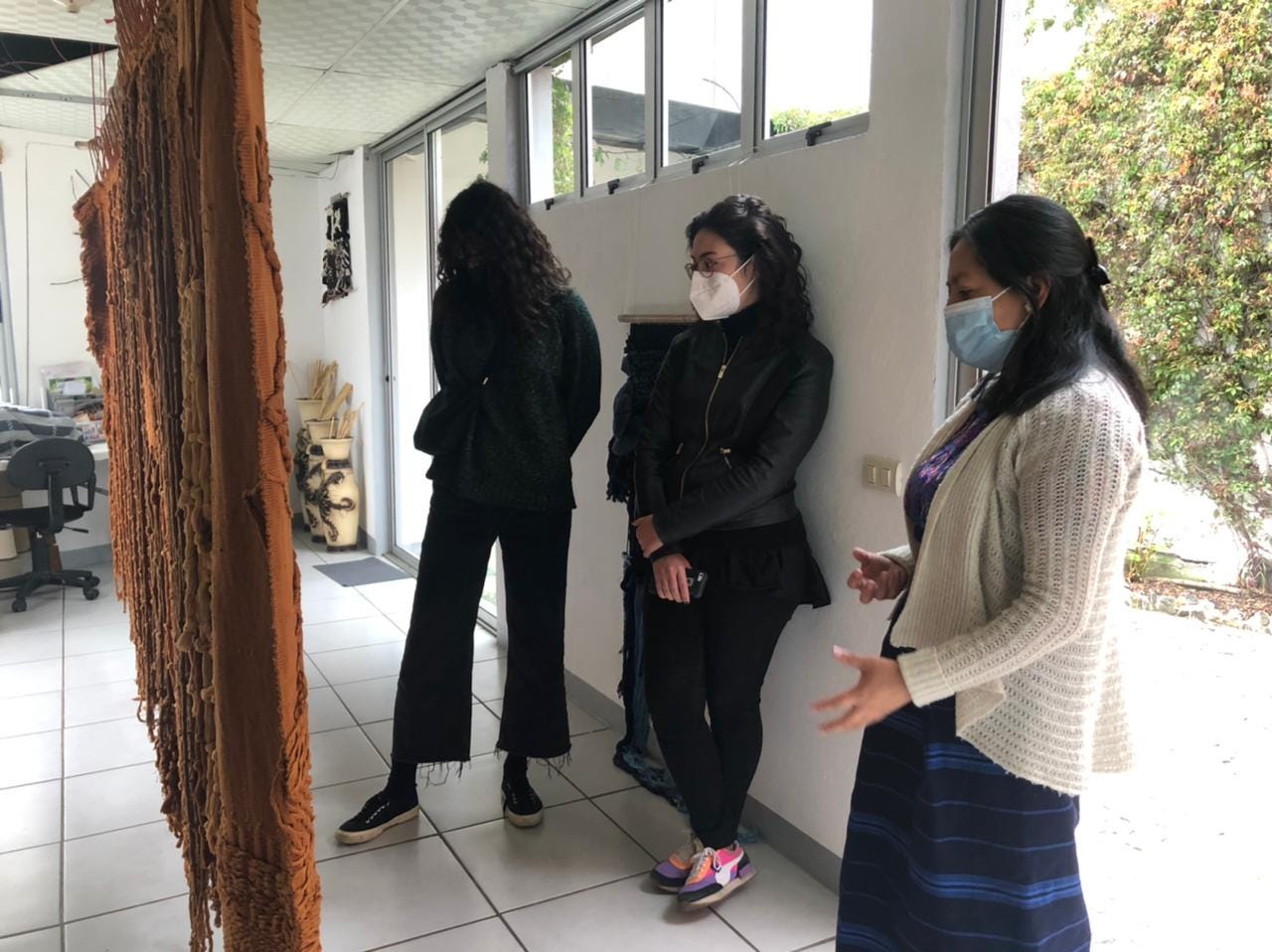Leonardo Bravo:
Hello Ilaria. It's nice to finally connect as we've been trying to do one of these chats for Kaleidoscopic and here we are basically at the end of 2022 and getting ready for a more joyful and more multidimensional 2023. One hopes!
I'm in Berlin right now and you are in Italy spending time for the holidays with your folks. What drew me to your practice is how you define your role as a curator in broad and holistic ways, in very active and very generative ways. So I wanted to find out how those values have been shaped along the way, but also to see about how your experiences as a child inform the way you see the world and act upon it, especially around creativity, especially around the arts, especially around folks coming together in community. So it's a big one!
Ilaria Conti:
First of all, thank you for having me. It was very nice to meet you and have our initial first chat as we were thinking about this interview. It's important to be in conversation about one's practice with others, to see what makes sense and what resonates. Sometimes one might be stuck in one's mindset and convictions, so it is important to have the chance to share them, test them, and see what makes sense to you. I would say it is more than a conversation: it is an exercise for me.
Leonardo Bravo:
Absolutely. I completely agree and it's a total joy for me to have these conversations because I am very curious about how we as individuals act upon our sense of agency in the world. And that can be creative, that can be theoretical, that can be research-based. I'm interested in that notion of theory into practice and how people engage with the stuff of life.
Ilaria Conti:
So where would you like me to start? From my childhood experiences? My exposure to contemporary art was definitely limited. Only now I see clearly, after almost 15 years of working in this field, the genealogy that traces back to why I'm interested in this. The seed lies in witnessing from a very young age a family made of individuals, of types of people, of workers that have been disappearing from society in the last 40 years. I grew up with paternal grandparents who worked the land as peasants, for landlords. And with my father, who still recalls episodes from his childhood during World War II—when the Nazis were forcibly taking food and resources from people living in the countryside—and who then worked as a union representative during all of his life. Also, in my family still lives the memory of my maternal great-grandmother, who could not write or read and came to Rome to escape the poverty of the rural south, and of her husband, my great-grandfather, who was murdered by fascists for his political convictions and his ethnic origin. And the list goes on. Overall, while growing up, powerful things were passed on to me by my family about class, politics, and collective and individual struggles—and about the importance of being humble: of humbleness as a political stance. I feel extremely lucky and grateful for the degree of political consciousness I grew up with.
Such exposure speaks to me very strongly still today, and it is all I can think of when asked where I got my “spark.” My life could have taken a different professional direction, but what drew me to our field was an interest in the prospective ability of artistic practices to imagine beyond the current status quo. In this sense, I try to honor through curating the things I witnessed as a child: all those people and all those worlds—many of which have disappeared by now.
In regard to my curatorial beginnings, I studied in Italy, in a very conservative environment. This was not a thousand years ago: I graduated in 2010! But it was a conventional context in which you had to study things that were already pre-packaged in fixed categories and worldviews. Think of Arte Povera, for instance. The first thing that I felt really drawn to while in university was the relationship that Italy had through the arts with forms of international activism. So I focused on contemporary practices related to colonial histories, and in particular to Palestine. That was the first subject that really set the tone for who I wanted to be professionally and for my subsequent work. From there on, I started focusing on what shapes me now: an interest in decoloniality and social, political, and epistemic forms of justice.
Over time, I realized that I was not interested in a geographical focus, but in a methodological one. I started researching and working with artists in relation to their method of working. Research-based practices have become central to my practice, especially those aiming to subvert the epistemic hegemonies that shape our understandings on the world—our cosmovisions.
When it comes to discussing my work as a curator, I try to stay away from a process of self-identification. I try not to say that I am a curator, but rather that I work as a curator. I try to maintain such a line of separation, because when that division is not in place, the production of labor gets mistaken for the production of an identity—and this in turn engenders other issues, which include being underpaid, having your labor being mistaken for a leisure activity, having your knowledge being extracted for free, and so on.
Leonardo Bravo:
In that sense there's a role of a mediator, as somebody who's maybe a translator, a bridge builder. A kind of a brokering almost, which are an interesting set of skills and facilities or faculties to be able to bring to bear on the practice. It was also beautiful to hear what you said about your family and honoring both the very deep creative aspect but also the people that were working class, the people that represented the class struggle. I had shared with you that I come from Chile and my parents were very involved in the Chilean left and those types of liberation movements. I recognized at a very early age this sense of idealism towards a new type of world making and then how that is imagined from the ground up, and the kind of consciousness that's required, and that has changed so much, I think from 40, 50 years ago, or the 20th century.
Ilaria Conti:
Totally. The one thing I would like to add, to avoid misunderstandings or manipulations of what I said earlier on, is that I grew up in a middle class environment. I did not grow up in the poverty that my parents experienced. But I have a crisp sense of the privilege that I carry with me. It is an ever-growing process, because what one understands to be her own privilege expands and deepens over time. As a result, what I try to be conscious of is my positionality and the privileges that I carry with me—while honoring the sense of urgency that sits at the heart of my practice. I will wrap up this particular topic by saying this: I think a lot about how lucky I have been to work in many international contexts and locales. I find absurd and coherent at the same time that I have to traverse all these professional experiences to be able to honor and conceptually “come back” to the people I grew up with. Had you asked me this five years ago, I would have not been able to articulate that my work has been structurally shaped by those people in my life.
Leonardo Bravo:
So to take it a little further and to get more concrete, can you share with us about the La Nueva Fabrica project that you've been working on, and probably formally begin to launch in 2023.
Ilaria Conti:
La Nueva Fábrica is an amazing contemporary art and residency space in Antigua, Guatemala. The conversation with LNF started at the beginning of 2020 and stemmed from my time working as a Research Curator at the Pompidou Center, where I was part of the curatorial team of a multi-year project of exhibitions and research titled Cosmopolis. While at Pompidou, I visited Guatemala and deepened my exchanges with local artists—some of them were then invited to participate in the exhibitions I co-curated in Paris. When my collaboration with the museum ended, I had a deep desire to continue the conversation with the interlocutors I had in Guatemala.
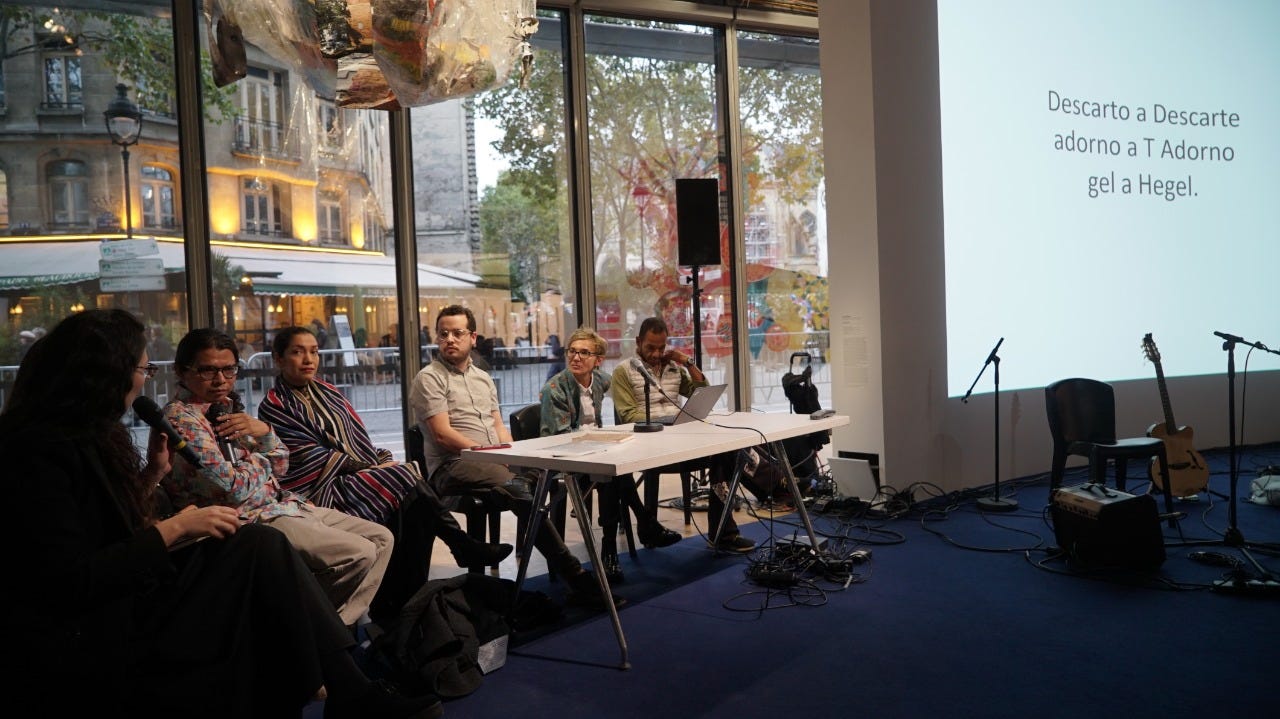
From this came the opportunity to do a two-step curatorial residency at La Nueva Fábrica, in 2021 and 2022, respectively. With LNF, we structured our conversation as a long-term collaboration with the organization, its people, is processes. I was very humbled by the fact that I was the first curatorial resident (by the way, the residency call is currently open!). This collaboration will result in a final exhibition in 2024. But besides the final result, what this residency created for me is the opportunity to be in long-term conversation with an organization, to have a mutual relationship over a long period of time.
Leonardo Bravo:
This seems like a very nourishing and reciprocal relationship, and I imagine you can help bring some guidance around structural and organizational issues, or to help grow the organization potentially.
Ilaria Conti:
Yes, but it mainly is about being a good interlocutor. As an example, LNF recently closed the first mid-career survey in the Americas of Regina José Galindo—a major artist from Guatemala whose work has been deeply committed to issues of social justice. The exhibition was curated by a great curator and friend, Maya Juracán. I had the chance to accompany the conversations on the exhibition publication, which is the first bilingual publication on Galindo in Central and South America and LNF’s first publication ever. It was an honor to be part of this process and provide advice as and when needed. What this kind of relationship with a project or an organization comes down to is the ability to be committed to a place. It is incredibly valuable. It creates a different kind of relationship, a different kind of ethics.
Leonardo Bravo:
That's a really great point, because that's what really resonated to me about when I started looking at your work. That there is a way in which you approach this intersectionality around "curating" in a way that is relational, that is relationship building that involves a set of commitments that are deeper and are not just temporal, which tends to be the affect of the practice.
Ilaria Conti:
That is always my desire and intention. Whether that is always the result, it's not for me to say. You were talking about possible definitions of curating: I believe it definitely means to build bridges, to connect. But I also recognize that a lot of my education—intellectual, emotional, interpersonal, spiritual—comes from what the artists I have worked generously with shared with me. And so, with this in mind, part of what it means to curate is also to create a process that is ethical, especially toward artists. To give back, to be mutual toward them with the same degree of generosity.
At times, however, institutions have processes rooted in a different kind of agenda. It is the curator’s responsibility to stand in between and protect the ethics of a project and its processes, to soften certain rigidities that institutions tend to have. Ensuring ethical processes at the institutional level is something incredibly complex, but it is a curatorial responsibility—the ultimate curatorial responsibility, probably, and certainly a lifelong endeavor.
Leonardo Bravo:
So let's talk about those complications, the troubling that happens working within institutional structures, because especially this last year particularly, has shown a set of unravellings across structural systems that we are yet to see where things will end up. And of course, they've been triggered by the multiple crises of the pandemic, social crisis, political crisis over the last few years. It interesting to think of these issues that have been brought forward and how they might inform your work as you continue to sort of push forth in this more generative and open-ended approach, but also within the institution itself, and maybe see a way forward within that.
Ilaria Conti:
It will take time to fully understand and digest some of the processes you are referencing. What has shifted quite dramatically is the ability to name certain things. The expansion of our vocabulary when discussing our labor is also an expansion of our agency: it means being able to name unethical and exploitative mechanisms, and therefore resist them.
At the beginning of 2020, I was working precisely on this ability to visualize and name labor issues in our field. I was doing so as part of a residency in Athens with 3 137, a wonderful artist-run space. Then the pandemic hit, and the polarization between labor conditions and art workers’ needs became fully evident; it somehow “exploded” from within. Infrastructural issues became an explicit urgency (that is to say: they were always an urgency, but were less explicitly articulated as such) for a much bigger group pf professionals in our field, everywhere. New organizations were created to this purpose—I think for instance about Art Workers Italia. It was great to witness this push from the bottom up. I feel that now we have more accurate words to name certain exploitative mechanisms, and that there's more clarity on issues such as compensation, work conditions, and very importantly, rest. These things were not properly acknowledged, or named, before. Now that such a huge push has taken place and a broader vocabulary has been formed to address infrastructural issues, it is our daily responsibility to advance this process in any way possible, including by manipulating the infrastructure and being even more outspoken about systemic issues.
Leonardo Bravo:
That reminds me of our earlier conversation where you brought up this notion of resistance into re-existence and this sense of pushing through into what this new thing might become.
Ilaria Conti:
The notion of resistance as re-existence is a crucial one for me—and not just on a professional level. It something that I encountered in the writings of Adolfo Albán Achinte, a scholar, activist, and artist from Colombia. He formulated this while discussing the role of the arts, particularly in relation to Afrodescendant communities in his home country, Colombia. Achinte defines re-existence as the ability to “re-define and re-signify life in conditions of dignity and self-determination, facing the biopolitics that controls, dominates, ad commodifies subjects and nature.”
I find this exhortation to re-imagine beyond the hegemonic epistemic system very urgent and liberating. This idea has been a driving force for me—it is one of the main ways in which I name my urgency to do the kind of curatorial work I do. This urgency is something that I try to articulate further and further as I become older. It’s an ever growing and flowing framework. The core of re-existence is that it's not just about opposing the status quo: it is the ability to imagine beyond the limits that have been imposed on us.
Through re-existence, I reach the core of my practice, the element I ultimately strive to work toward: epistemic justice. What I seek to pursue through my practice is a process and ethics that allow to rethink the possibilities of our existences, of our work, but also of institutions. Being able to keep the possibilities of existing and sense-making open, beyond what the infrastructure dictates, is the focal point on which I continue to center my practice.
Leonardo Bravo:
I completely agree. It seems that at every level of society the structures really harden and are cemented, so it's how to create spaces that are softer, more open, more malleable, that are nimble, for like La Nueva Palabra to exist.
Leonardo Bravo:
So, just to get outside of the art world or the work you do, how do you find this sense of communal and collective transformation outside of the context of the art world just this last year?
Ilaria Conti:
This past year for me was a year of transitions, moving back to the United States, spending a substantial amount of time in Guatemala, and so on. Being able to commune with people I have been in conversation with for a long time—artists, especially—has been very powerful. I am deeply moved by these encounters and conversations, regardless of whether they are meant for a curatorial outcome.
The other element that I really regard as important is: reality checks! I greatly enjoy being with people that live and work outside of my professional field. This is an extremely important point, because we work in a field that is still very elitist.
Leonardo Bravo:
And siloed!
Ilaria Conti:
Very much so. It is very important to not disconnect and close oneself into this bubble that is our professional field.
Another thing I am trying to focus on is producing work that is not meant for the art world, as I realize that our understanding of work is structured in a very selfish way. I am therefore exploring how I can put my work, my knowledge, my forms of labor production at the service of others outside the art world. How I can do things that are useful to other people out there in the world, and not just to my professional path. I say this because I find very problematic the degree of time investment, the overall amount of time that is put into self-growth and nourishment. I am trying to “hack” my own time and leak some of it towards something that is not about me. I am trying to cut the extraordinary degree of self-absorption that is often encouraged in our field.
Leonardo Bravo:
Because otherwise, it's a lot of discourse and not enough process or practice.
Leonardo Bravo:
And finally, what kind of projects are coming up for you this year?
Ilaria Conti:
In February I am presenting Present Memories: On the Politics of Image-Making, a full-day event that is part of an ongoing series of public programs titled Pensiero Plurale, which I have been curating for Magazzino Italian Art in New York. The series is centered on issues of cultural and social justice, intersectional thinking, and the arts across Italy and the United States. This program, in particular, will address the politics behind some of the fictitious narratives that shape historical memories and present-day identities in connection to Italy. The invited speakers, which include artist Dawit L. Petros, curator Mistura Allison, and scholar Teresa Fiore, will discuss strategies to question and critically rethink such processes of knowledge-formation through visual and material culture.
Then, coming up in May, is an exhibition that is particularly dear to me. The project is titled Resilient Currents: on Communal Re-Existence and will be presented in Paris in collaboration with Thanks for Nothing, a nonprofit organization that focuses on contemporary art practices related to societal issues. The exhibition embraces a methodological focus – rather than a thematic or geographical one – by highlighting artistic practices connected to Abya Yala characterized by a commitment to the communal, a term that in the context of decolonial studies signifies a shared political agency and sensibility that, regardless of its being enacted individually or collectively, honors the interdependency that connects all beings and entities. The show will present new commissions alongside pre-existing artworks and research projects by a group of 26 artists, practitioners, and activists. Each one of them has an incredibly poignant perspective; it will be powerful and moving to see them coming together in one single space.
Leonardo Bravo:
Well Ilaria, it's all very exciting. This has been such a joy and hope we can meet up soon, either in New York or Berlin. Ciao!
https://ilariaconti.me/
IG: @ilariamarion




